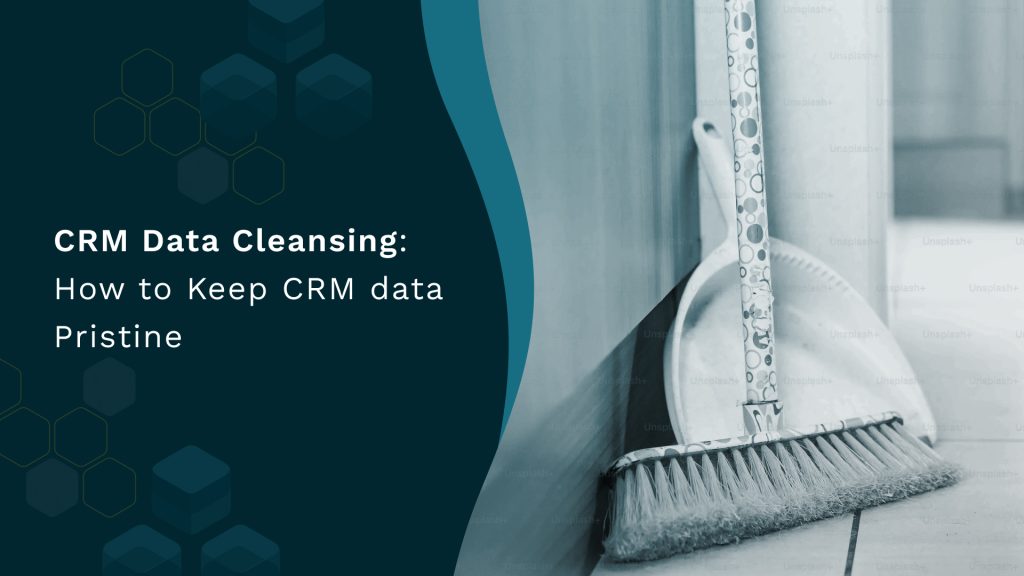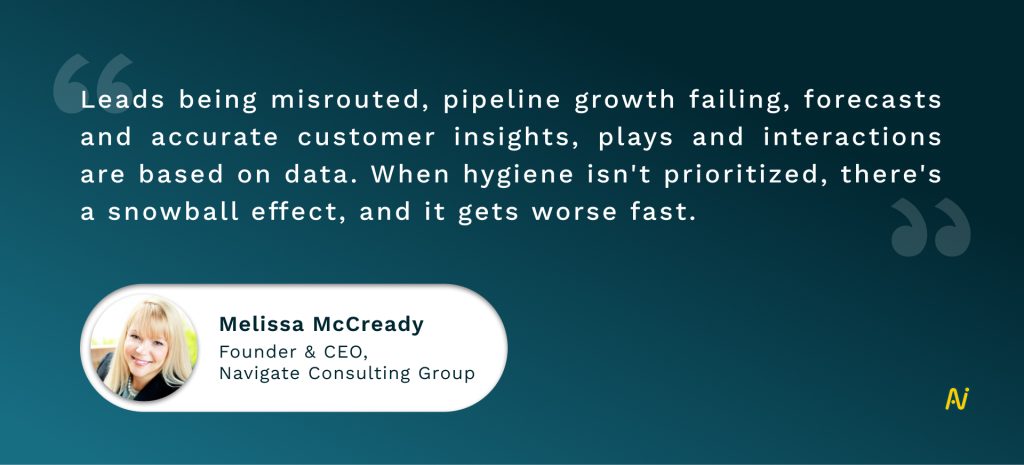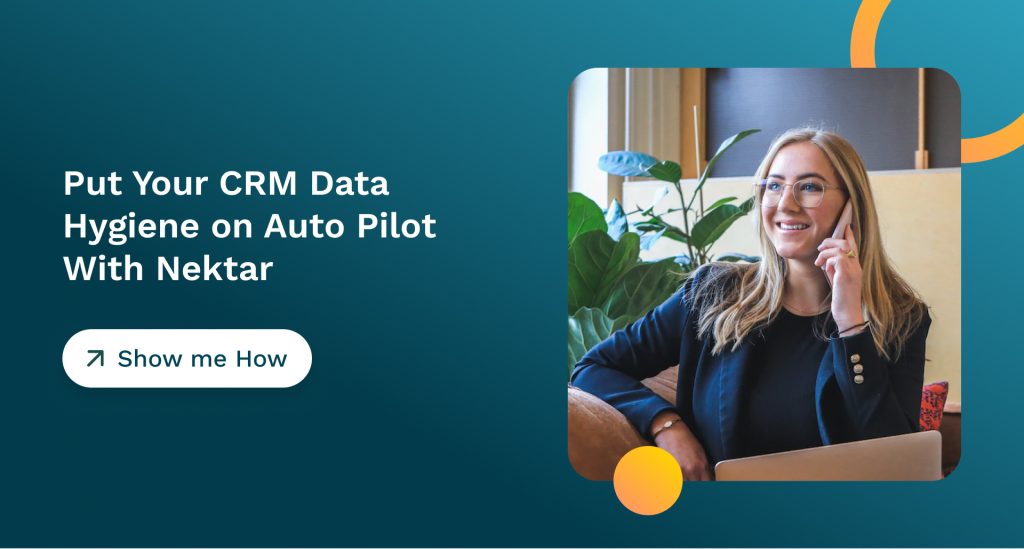
CRM Data Cleansing: How to Keep CRM data Pristine
- CRM
On average, in a B2B company, the volume of prospect and customer data doubles every 12-18 months.
This massive influx comes with a significant risk of errors, duplicates, outdated records, and other inconsistencies creeping into your CRM.
The longer this dirty data sits in your CRM, the worse the outcomes of your CRM would get much like a snowball rolling downhill.
What can you do?
Implement robust CRM data cleansing practices. These practices include conducting regular CRM data audits, using CRM data validation techniques, and leveraging automated tools to keep your data clean and credible.
In this article, we will learn all about CRM data cleansing and how automation and AI ease the process of data cleansing.
Let’s get started with the basics.
What is CRM Data Cleansing?
Imagine you are going on a trip and need to pack your stuff. Will you be able to do it in a messy room full of stuff scattered everywhere? You’d spend ages just trying to find your things, let alone packing them efficiently. But when everything is neatly organized, you can do all the packing in a fraction of the time.
Well, CRM data cleansing is similar. It’s all about taking that chaotic, messy data and transforming them into well-organized and accurate datasets.
In a nutshell, CRM data cleansing is the process of identifying and fixing inaccurate or incomplete data in your CRM database. It involves detecting and eliminating duplicate, outdated, or irrelevant data, ensuring that the CRM database remains accurate and up to date informing smarter and reliable business decisions.
How Poor CRM Data Hygiene Affects Your Revenue
For great results, you need to be careful of what you feed your CRM system. Or else, it becomes a classic case of “garbage in, garbage out.” You cannot expect great results from CRM insights if the source of the data in it is unreliable.

Data lies at the heart of gaining visibility on where to make improvements, drive focus on leading indicators and fix the revenue funnel before it breaks. If the data in the CRM in itself is plagued, you cannot expect insights from it that drive revenue.
In fact, it is quite the opposite. In a recent survey, 44% of respondents estimated their company loses over 10% of annual revenue due to poor data quality.
Such data inefficiencies are causing revenues to leak through your funnel in myriad ways.
Some of them include:
1. High employee turnover
CRM users aka your employees are reaching a saturation point. 64% of them say they would consider leaving their current role if organizations don’t invest resources in a CRM data quality plan. In a world where talent is scarce, employees leaving would mean so much more time and resources gone in hiring more people, onboarding them and keeping them engaged.
2. Poor sales forecasting
The quality of your sales forecast has a direct impact on your revenue. A poor sales forecast is a result of bad data fed into your systems that fail to predict how much revenue will be closed quarter after quarter. The result is wasted resources on avenues that lead to no result.
3. Poor ROI from tech stack
Revenue leaders invest in different tools as a part of their tech stack, CRM being one of them. But all these tech stacks can only deliver ROI when they have the right data to work with. Without quality data, these tech stacks will just remain as shiny objects that eat up budgets without delivering any meaningful value to revenue.
4. Poor targeting
Picking up all contacts from a CRM and running a uniform campaign for all is passe. Today’s customers want hyper-personalized messaging, which requires marketing teams access to high-quality data that tell them more about their contacts than simple name and email ids.
CRM data tells marketing teams who to target for their campaigns. It fails to address the “why.” Bad data aggravates this problem by sending wrong messages to the wrong customers for solutions they might not even be looking for, thus putting the reputation of a brand on the brink of damage.

Advantages of CRM Data Cleansing
Leverage the power of a clean CRM to drive business growth in the following ways:
1. Effective prospect communication
Clean data ensures you reach the right people with the right message at the right time. By having accurate contact details, preferences, and purchase history, you can personalize your follow-ups, build effective marketing campaigns, and provide exceptional customer service.
2. Improved productivity
Outdated or incorrect data leads to wasted time and effort. We are not the only ones saying this, a report by Mckinsey says that employees spend 9.3 hours a week simply searching for the data they need.
By keeping your CRM clean, you avoid redundant tasks, such as contacting the same leads multiple times or dealing with undeliverable emails. It streamlines your processes, increases efficiency, and allows your team to focus on what matters most—building valuable customer relationships.
3. Improved conversion rates
78% of businesses say that the data they collect helps them increase customer acquisitions and lead conversions.
Reliable CRM data enables your sales team to target the most promising leads and opportunities. By eliminating duplicates, outdated leads, or invalid contacts, businesses optimize their sales efforts, increase conversion rates, and close deals more effectively.
4. Cost savings
Maintaining clean data prevents unnecessary expenses. By avoiding mailing or marketing to incorrect or inactive contacts, you save on time and costs. Additionally, you reduce the risk of penalties associated with non-compliance, such as sending messages to individuals who have opted out.
Here’s something to cement our claim, data quality issues can cost a lot of revenue around 1/5th of the sales to be precise.
5. Better customer segmentation
Clean CRM data allows you to segment your customer base effectively. By organizing and categorizing customers based on accurate data points like demographics, purchase history, and preferences, you can create targeted marketing campaigns and personalized experiences that resonate with specific customer segments.
The Role of Automation and AI in CRM Data Cleansing
Businesses spend 80% of their time cleaning the datasets and only 20% of the time is spent actually analyzing the data.
You’d agree that’s a huge loss of resources.
However, we are in an AI-driven business landscape, where AI can do anything and everything. It can come to the rescue in this area as well.
By harnessing the power of AI, businesses can automate the data cleansing process, freeing up valuable time and resources and dedicating more efforts towards meaningful data analysis. With AI by your side, you can analyze heaps of information faster than you can say “data cleanse.”
Let’s quickly get into the how.
1. Data validation and cleansing
Automation and AI tools can easily analyze large volumes of data to identify inconsistencies, errors, and duplicates.
These technologies can automatically validate and cleanse data by cross-referencing it with reliable sources, detecting patterns, and applying predefined rules and algorithms. This helps in efficiently removing inaccurate or redundant information from the CRM.
2. Duplicate detection and resolution
Identifying and cross-checking duplicate records manually can be a tedious task and prone to errors. AI can automate this process by employing advanced matching algorithms that compare various data points to identify potential duplicates. This saves valuable time and effort while ensuring a higher level of accuracy in either merging or eliminating duplicate entries.
3. Data enrichment and updates
Businesses can let automation and AI enrich CRM data by gathering additional information from external sources such as social media profiles, public databases, or third-party data providers.
This enhances the relevance of customer records. Also, these technologies can automatically update customer data by tracking changes in contact details, preferences, or interactions, ensuring that the CRM remains up to date without human intervention.
4. Intelligent data profiling
The AI technologies can perform intelligent data profiling, analyzing patterns and relationships within the CRM data. This helps in quickly identifying data quality issues, such as missing values, inconsistencies, or outliers. By highlighting potential data problems, businesses can take proactive measures to improve data quality and accuracy.
How Nektar Keeps CRM Data Evergreen
Nektar‘s AI for RevOps solution puts CRM data hygiene on auto-pilot.
It is purpose-built for contact and activity capture with a vast library of logical inferences built under the hood. Nektar ensures every piece of data living inside your CRM is accurate and reliable. Here’s how,
1. Unmatched sync accuracy
The data sync capabilities ensure accurate management of Accounts with multiple opportunities. By using their AI algorithm, Nektar establishes connections and assigns confidence scores. It can also capture complex combinations of contact and activity data, effortlessly handling various scenarios in a jiffy.
2. Makes time travel possible
It retrieves past contacts, emails, and meetings associated with a specific domain and adds them to newly created opportunities. This functionality proves especially valuable when multiple sellers engage with the same company over time, providing instant context and knowledge transfer between reps.
3. Helps generate top-notch quality reports
Nektar.ai simplifies report generation by syncing contacts, emails, and meetings directly into Standard Salesforce objects. This ensures Operations professionals can easily access high-quality data for generating reports. Custom object support is also available.
4. Self-heals your Salesforce CRM
It automatically corrects and updates actions based on new information, prioritizing manual changes made by Salesforce users. Whether it’s modifying prospect meetings or moving contacts between opportunities, Nektar.ai makes sure that Salesforce records stay updated and learns from these actions for future synchronization.
5. Filters contact automation
Nektar automates contact creation and association with existing Salesforce accounts based on domain matching. It extracts job titles and phone numbers from email signatures, dynamically assigns buying committee roles, and allows filtering to prevent syncing of contacts from specific domains listed in the ‘deny list’.
Book a call with one of our experts and deploy a data cleanser that requires ZERO adoption.
